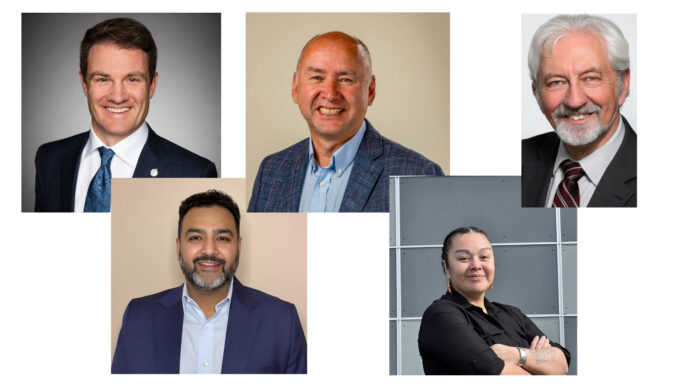
The Federal Election is set for Monday, April 28th.
My Bulkley Lakes Now reached out to each candidate running to become the Member of Parliament for the Skeena-Bulkley Valley riding for their responses to the following five questions:
- Tell us about yourself.
- What makes you the best candidate to represent your riding?
- What are the most important issues in your riding and why?
- What is your position on tariffs?
- Are there any final thoughts on any topics that you would like to share?
IN ALPHABETICAL ORDER (Last name):
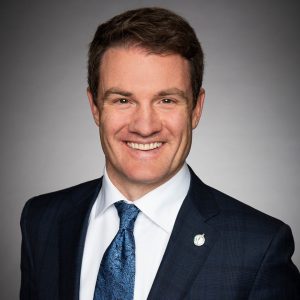
Taylor Bachrach, NDP (Incumbent):
I was born and raised in a tiny rural community here in northern BC with a general store, a two room school and a community hall. My parents always instilled in me the idea that we should always give back to the community as much as, if not more than we get. This guiding principle is what brought me to run for politics after working for years as a small business owner and community advocate. I served as a municipal councillor in the Village of Telkwa, as mayor of Smithers, and since 2019 I’ve had the honour of serving the people of Skeena-Bulkley Valley as Member of Parliament. In my time in Ottawa, I’ve focused on improving rural services, delivering climate solutions, and pursuing reconciliation with Indigenous people.
Inderpal Dhilon, Liberal:
My Bulkley Lakes Now reached out to Dhilon but did not hear back in time for publication. More information can be found on his website: https://inderpaldhillon.liberal.ca/
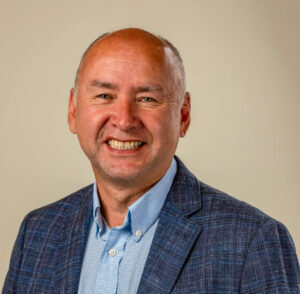
Ellis Ross, Conservative:
I was born in Kitamaat Village and still live there with my family today. I left my village for about 10 years to find work and housing.
I returned and was elected to our council from 2003-2011. I was then elected as Chief Councillor in 2011 and then by acclamation in 2013. I resigned from Council in 2017 so I could run for the position of MLA in Skeena. I was elected twice as the MLA for Skeena and decided not to run again in 2025 because I decided to run as the Conservatives candidate for Skeena-Bulkley Valley.
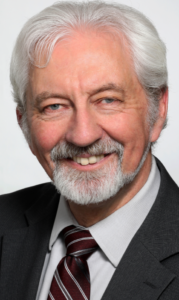
Rod Taylor, CHP (Party Leader):
I was born in Minnesota and moved to Canada with my parents and siblings in 1968. I met my wife, Elaine, in 1973 in the Kootenays and we married in 1974. Last year we celebrated 50 years of marriage. We have two children, four grandchildren and two great-grandchildren. In the Kootenays I was horse-logging. After we were married, I farmed and later worked on the CN Railway in Alberta for 6 years. We moved to Smithers, BC in 1987 and I worked about 25 years in the lumber industry. I’ve been a forklift driver, a lumber grader, a first aid attendant, a shop steward, a quality control supervisor and a shift supervisor. I served on the Bulkley Valley District Hospital Board and for many years on the Smithers Pro-life Society Board.
Elaine and I love gardening, music, birdwatching and reading (history, poetry and a lot of political commentary).
I have run for office a number of times, both federal and provincially because I want to see Canada once again become the “True North Strong and Free.” I want to see our culture of life restored, our cities prosperous and our children protected from the many assaults on their safety and happiness: (crime, drugs, porn, excessive taxation, red tape and endless regulations). In 2014 I became National Leader of the Christian Heritage Party of Canada.
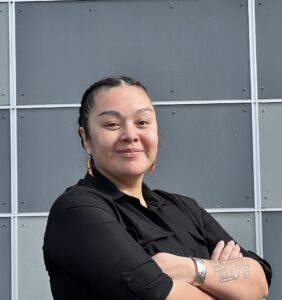
Adeana Young, Green:
Firstly, I’m a mother of 4 to my 2 daughters, 2 sons and an aunty to many. My parents are fortunate to have 22 grandchildren. I am a part time Haida Language and culture teacher for kindergarten to grade 7 at Daaxiigan Sk’aada Née and with that I volunteer my time to teach the language to friends and family outside of regular working hours. I’m a Director for Níislaa Née Healing House Society and a committee member of the Resolutions Committee for Council of the Haida Nation. I am a former Deputy Chief Counsellor and Councillor for Old Massett Village Council (OMVC), former School Board Trustee for SD No. 50 Haida Gwaii. During my time with OMVC some of my greatest accomplishments, with the support of Chief and Council we ensured that during the Pilotage Act Review Roundtable, that they included the concerns that were brought forward and were strongly considered in their report prior to submitting to their Minister. Some of those concerns were categorized as follows: Governance, Safety, Labour and Economics, Tariffs, Traffic and Marine Life, Licensing and Enforcement, Legislative Process. The Chief and Council were able to separate our Health Department moving from under the Indian Act to its own Society and ensured that the solar powered renewable energy project is owned and operated by community and not corporation. I sat at the Coastal First Nations – Great Bear Initiative table as a board member during my time with OMVC and fostered working relationships with the Coastal First Nations at that table. I was able to participate with BC Indigenous Women in leadership conferences where we developed the BC Indigenous Women’s Declaration which was passed with the BC Assembly of First Nations as well as the National level at the Assembly of First Nations. As a school board trustee, we accepted and approved many field trips for our students to get out in the wilderness and have the opportunity to learn about and from the land. We also updated policies such as ensuring there are male and female chaperones on field trips for sufficient care taking of our students. There have been many achievements, and these are just a few to mention.
What makes you the best candidate to represent your riding?
Bachrach:
People know that I show up, I listen, and I work extremely hard. I’ve always put the needs of our communities at the forefront of my work in Parliament. I’ve helped secure funding for infrastructure projects and emergency relief. I’ve fought to restore and grow services such as post offices, addiction recovery centres, and passport services. I’ve stood next to our workers in support of their rights. I will always work hard for our people, and our communities.
Ross:
I want everyone to get ahead. I have always believed that a good, family-supporting job is a way out of poverty. My background is in Aboriginal Rights and Title, environmental assessments and advocating for projects and the economy. I firmly believe that it’s up to the voters to decide who makes the best candidate to represent them.
Taylor:
I believe that the Christian worldview and perspective I represent are key to restoring Canada’s economy and culture. Our nation was founded on biblical principles. The Charter of Rights and Freedoms (central feature of our Canadian Constitution) begins with these words: “Canada is founded on principles that recognize the supremacy of God and the rule of law.” I believe that if we want to experience God’s blessings on our land again—on our weather, our fish, our forests, our waters, our trade relationships, our industry, our crops, our schools, etc.—we must stop violating God’s moral principles and begin following His path.
The CHP has long stood on the principle of protecting innocent human life at all stages, from conception until natural death. Leaders of the major parties are afraid to speak up in defence of the preborn. With no laws whatsoever protecting them—right up to the moment of birth—approximately 100,000 babies per year are killed in Canada by abortion. We cannot expect God’s blessing on our nation while our politicians and the people who elect them continue to tolerate the shedding of innocent blood.
Canadian children are being subjected to deceptive indoctrination in our public school system where they are told that they can change from being a boy into being a girl . . . or vice-versa. Many have been given puberty-blockers, hormone treatments and even drastic surgery, having body parts removed in an effort to change their outward appearance. The science is clear: a person’s sexuality and function are a reflection of their DNA and that cannot be changed. Many young people who have “transitioned” regret it and are now “detransitioning.” However, many of them are subject to depression and even suicidal ideation when they realize that they have become sterilized and will never be able to become a biological father or mother. In order to spare more young people this trauma and confusion. The CHP would immediately end the transitioning of minors.
Young:
“If it ain’t broke don’t fix it” might seem to be applicable in our riding, considering the Skeena-Bulkley Valley has been NDP since 2004. As the Green Party candidate in this riding, I can confidently say that I’m here to help. I’m running in this election as a Green to ensure that our policies are brought forward to Parliament as a wholistic approach and not a divide and conquer. Our Green policies ensure that there are no more pipelines going through traditional territories, enact a Just Transition Act ensuring effected workers and communities lead their own plans with legally protected rights to income support, retraining, and career placement. The Green policies will establish a National Skills Tracking & Transition Database, ensuring every fossil fuel worker has a direct job -matching
pathway to well-paid, long-term work. It’s our responsibility to create safety nets for workers facing job losses. We will modernize Employment Insurance (E.I.), support small business growth and innovation, expand green and inclusive entrepreneurship, and enhance small business access to federal contracts. We have safe and secure policies for agriculture and food security, sustainable fisheries management, indigenous leadership and marine governance, aquaculture reform and regulation, marine conservation and climate resilience, and marine waste and pollution reduction policies. The Green Party also recognizes that real security isn’t just about feeling safe. It’s about knowing you’ll have a roof over your head, food on the table, and care when you need it. We’re ready to take on the housing crisis with the scale and urgency it demands. We’ll triple Canada’s social housing stock in just seven years – bringing back the federal government’s role in building, financing, and protecting non-market housing. This includes bringing land back into public hands. We believe that no one should be forced to live in poverty, and care should never be for sale. We’ll enforce the Canada Health Act. Surely but not lastly, Indigenous sovereignty and self-determination are at the heart of our policy. The Green Party rejects the outdated colonial doctrine of extinguishment and assimilation and recognizes that Canada was built on Indigenous lands.
What are the most important issues (up to three) in your riding and why?
Bachrach:
There are so many important issues that need to be addressed in this election, but the three at the top of mind for myself and so many people in the Northwest are: – Positioning our region and Canada as a whole to withstand Donald Trump’s threats to our economy and sovereignty; – Ensuring rural communities have the services and supports they need to deliver a high quality of life for residents and attract professionals; – Standing up for our coast, watersheds and wild salmon in the face of Conservative attempts to gut key legislation.
Ross:
My number one priority has always been to eliminate poverty through a strong economy.
My second priority is to rebuild communities that have seen jobs shrink or disappear. Many of our communities in Skeena-Bulkley Valley are suffering from the closures of mines and mills, so I will work with them to help diversify their industries.
Third priority is the cost of living. For the past 10 years, NDP-Liberal policies have increased the cost of living. We need to a new government to bring about change.
Taylor:
Heathcare: Our healthcare system has been severely damaged by the policies of both the federal and provincial governments in response to the covid pandemic. From Justin Trudeau on down—his Health Minister, his Justice Minister, his Transportation Minister, his Finance Minister—all of them took the very unscientific view of approving and promoting an experimental gene therapy (which they called a “vaccine”) and they claimed over and over that it was both “safe and effective.” The results have proven otherwise. Canadian were subjected to brutal mandates, were deprived of their Charter-protected rights and some had their businesses destroyed and their bank accounts seized. Canada and the provinces must now rebuild the healthcare system. We need to rehire and compensate doctors and nurses who were unjustly fired.
Energy and Carbon: Although Mark Carney says he will remove the hated consumer carbon tax on vehicle fuel and home heating, he plans to shift it to an industrial carbon tax which will only be passed on to consumers. Mr. Poilievre says he will remove all carbon taxes but he will try to reduce CO2 output in other ways: carbon capture and sequestration. This will still cost gobs of money, will still raise the costs of production and will do nothing for the environment. We need to end the war on CO2. Carbon dioxide is NOT pollution! It’s plant food. The connection to climate change is an unproven theory and we will treat it as such.
Natural Resource Exports: The CHP supports the responsible harvest, processing and sale of natural resources: lumber, minerals, oil and gas. We support well-designed and environmentally-stable pipelines. We insist, however, that our resources should be processed in Canada, not in China. Timber should be turned into lumber here. Raw bitumen should be turned into synthetic oil in Alberta before being put in a pipeline. It’s safer and Canadians would benefit from the jobs. Oil must also be allowed to be shipped to our Eastern provinces.
Young:
Affordable Housing:
Affordable housing is a human right, and it’s time we treated it like one. Canada is facing a housing crisis and we’re finished with band-aid solutions. Housing needs to be declared a national emergency and we would launch a bold, ambitious plan to end homelessness with a decade. This starts by making housing a human right in federal law, with significant investments in strong tenant protections, rental assistance, and non-market housing. We will make housing a national priority, invest in affordable housing, strengthen rent control and tenant protections, create homelessness prevention and supports, develop and implement a For Indigenous, By Indigenous Housing Strategy ensuring long term, sustainable funding for Urban, Rural, and Northern Indigenous housing rather than short-term project-based allocations.
Accessible and affordable healthcare:
Many of our communities require travelling to access healthcare services that they don’t have access to in their communities. Our policy will reform the Canada Health Transfer to guarantee fair funding for rural and remote healthcare services, ensuring staffing levels, facility funding, and service access are equitable across all regions. We will also implement universal Pharmacare to establish single-payer pharmacare across Canada. Greens have a plan to expand community health services, including mobile clinics for rural and remote communities and increased support for telemedicine, as well as require provinces to provide culturally safe and inclusive primary care services, especially for Indigenous Peoples, rural and remote communities, and historically marginalized groups. We’re committed to making mental health services fully insured under the Canada Health Act, ensuring public coverage of therapy counselling, and psychiatric care through general provi9ncial health transfers. Again, we will fully implement the Truth and Reconciliation (TRC) Calls to Action 18-24, ensuring all Indigenous Peoples have equitable access to culturally safe health care.
Emergency Preparedness:
As the climate crisis worsens, weather patterns are becoming dangerously erratic and natural disasters of all kinds threaten the lives and livelihoods of more and more Canadians. Of course we need policies that meaningfully tackle the climate crisis. But we also need a practical, well-coordinated plan to protect Canadians from the state of environmental emergency that now threatens our homes and families. Our plan would strengthen disaster prevention, expand climate-resilient infrastructure, and ensure to respond swiftly and effectively when crisis strikes. And we will ensure that when Canadians are hit by disaster, the can access fast-track financial assistance to help them recover.
What is your position on tariffs?
Bachrach:
The US has proven it is no longer the reliable trading partner it once was. Canada must both re-orient and diversify its international trade relationships and eliminate unnecessary inter-provincial trade barriers. There is also a need to incentivize value-added manufacturing and ensure raw Canadian resources are processed in a way that creates good jobs in communities in our region. The NDP has a plan that will ensure every dollar from counter tariffs go directly to the workers and communities impacted; strengthen EI to protect workers who lose their jobs; stop companies that took public money from gutting Canadian plants or shipping machinery and tools paid for by Canadians to the U.S.; and remove the GST from Canadian-made cars and trucks to support domestic manufacturing.
Ross:
I would retaliate dollar-for-dollar on US tariffs and help affected workers and businesses with tariff revenue.
Taylor:
The Trump Tariffs—however long they last and whatever they look like after serious negotiations with the US—were a wake-up call to Canada and caused more serious discussion of interprovincial trade barriers in two months than Canadian politicians had achieved in 30 years of lip service. Trump’s original complaint was about fentanyl pre-cursors coming from China through Canada’s poorly-secured ports and about human trafficking taking place on the Canada-US border. These are things Canada should have been dealing with long ago. PM Trudeau quickly promised to spend an additional $1.3 billion on border services. To put that in perspective, that’s less than we spend EVERY WEEK paying the interest on our federal debt. Canada MUST step up to the plate and secure our ports and land borders.
Trump also complained—legitimately about Canada’s insufficient investment in national defence. For too long, we have counted on the US to defend us and have allowed out own military to be ill-equipped, unprepared, understaffed and underfunded. This is also something our government should have addressed without waiting for advise from the US.
The response from the Liberal government and even from the Leader of the Opposition, Mr. Poilievre, has been entirely inappropriate and counter-productive. “Retaliatory dollar-for-dollar” tariffs on US products will not back Mr. Trump into a corner; they’ll only make it harder to negotiate in good faith and come to mutually satisfactory solutions for both parties. They’ll also raise the cost for Canadian consumers and Canadian businesses. Canadians are understandably concerned about potential losses of jobs. We need to bring a lot of manufacturing back to Canada. For too long, we’ve allowed China to manufacture our shoes, our clothes, our pharmaceuticals. We need to encourage Canadians entrepreneurs to make this things here—not with corporate handouts (which we can’t afford) but by reducing red tape and punitive business taxes.
Young:
At the heart of our trade policy is the goal of protecting Canadians from the fallout of America’s unfair and unprecedented attack on our economy. We must put Canada first by prioritizing investment in Canadians businesses and infrastructure, while divesting ourselves of the influence of American corporations, especially by US companies tied to Trump and his allies. We must strengthen Canadian sovereignty. This means establishing a national reserve of key resources, banning the sport of unprocessed materials like, timber, and continuing to put pressure on America by applying export taxes on key resources. We must continue to build trade partnerships with Mexico and Europe in order to limit the fallout of America’s illegal tarrifs. And we must hold US corporations accountable by introducing taxes on US tech monopolies and oil companies’ operation in Canada and reinvesting these revenues in local economies and Canadian jobs. It’s time US interest paid their fair share.
The future of Canada’s trading partnership with America has never been more uncertain. But there’s opportunity here. By standing up to America’s bullying, we can pave the way for a fairer, greener economic future – one rotted in sovereignty and independence.
Are there any final thoughts on any topics that you would like to share?
Bachrach:
The Northwest deserves a strong voice — someone with energy and experience who shows up and works hard. This is one of the most consequential elections in a long time because so much of what defines us as Canadians hangs in the balance — not just because of US threats but also the risk of Conservative cuts to programs and services people depend on. At the heart of our national project is the idea that we can — and should — take care of each other. Communities in the Northwest exemplify that spirit, and it’s the vision I hope to continue to bring with me to Ottawa.
Ross:
I am concerned about government debt and protecting the rights and freedoms of Canadians because neglecting both has serious long term implications. We only have to look at examples from around the world to see what is awaiting Canadians if we allow governments to continue to be shortsighted and politically driven instead of what is good for Canada.
Taylor:
One of the CHP’s least-known policies is our Fair Tax policy. We would completely eliminate the federal income tax, allowing Canadian workers to keep more of what they earn. We believe it’s wrong for the government to take the money you work hard for. And the harder you work, the longer your hours, the more they take!
We would replace that revenue stream with a flat tax on purchases. Canadians would be able to decide how much tax they want to pay. They’ll have a lot more in their pockets and they can decide whether to buy a luxury automobile or an economy car and pay a lower amount of tax. This would simplify the tax system. We would also introduce mandatory balanced budgets. This would put an end to endless deficit spending and allow us to begin paying down the debt. Canadian taxpayers are now paying $125 million EVERY DAY in interest on the debt.
We would remove federal funding from abortion, Medical Assistance in Dying (MAiD) and all gender transition services. That money would be directed to real healthcare (“hearts and hips”) and to building more and better spaces for palliative care, long-term care, assisted living and well designed hospitals.
We would invest more in our military and in caring for our veterans. Canada can become great again and can be a leader in economics, agriculture, energy and also in positive cultural values. We need to restore respect for government by providing accountable, affordable and transparent governance. The choice is up to us! learn more about the Christian Heritage Party of Canada at: https://www.chp.ca
Young:
Yes! Vote for what you believe in and not because of who you don’t want. Gin ‘waadluwan gud ahl kwaagiidang – everything depends on everything else. Here’s a little something I wrote and think it’s fitting for election time.
When you’re in a position of power and authority, it’s of high regard. You’re in that position because you applied yourself, you put yourself there. What makes such positions great is people trust you yet, on the same token your every move is being watched. Your voice now has volume, you’re recognized, you’re acknowledged, you’re valid.
When we practice recognition and acknowledgement it should be to lift each other up. Positions in which amplify the volume of our voices should be used as that of our ancestors. We will act with dignity and respect. Our ancestors fought and our cultures survived colonial structures imposed on our traditional ways of life. Our ancestral stories are of lessons, none of which take away the dignity, or integrity of those around them. In the colonial construct of elections and government, I will always remember who I am and where I come from. I’ll acknowledge that some folks may have lost traditional ways and recognize that without your voice, I don’t have one. Collectively, we are practicing the lessons from our ancestors. Respect and Reciprocity, you are you and I am me, we are sharing space.
Something going on in the Bulkley Valley Lakes District you think people should know about?
Send us a news tip by emailing [email protected].




